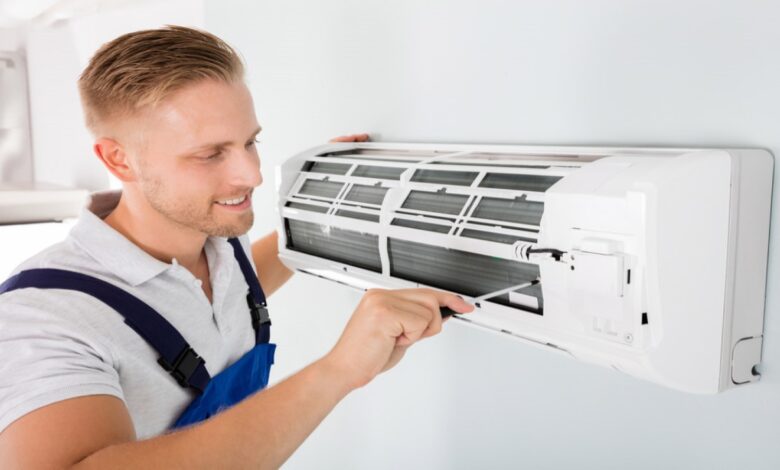The Evolution of Air Conditioning Technology

Key Takeaways:
• Understanding the pivotal historical milestones in air conditioning technology.
• Exploring sustainable practices and innovative trends shaping the future of air conditioning.
• The significance of intelligent s ystems for customizing user experiences.
• Analyzing the impact of energy-efficient air conditioning on global ecological concerns.
• Guidelines for selecting, maintaining, and operating AC systems for optimum health and efficiency.
Table of Contents:
- Modern Air Conditioning Innovations
- Energy Efficiency and Sustainability
- The Global Impact of Advanced Cooling Systems
- Consumer Guidance: Choosing the Right Air Conditioning System
- Maintenance and Upkeep: Ensuring Long-Term Efficiency
- Financial Considerations and Cost-Savings Tips
- Health Benefits and Air Conditioning: Clearing the Air
- The Role of Professionals in the AC Industry
Modern Air Conditioning Innovations
The realm of air conditioning is witnessing a more intelligent, more connected, and ecologically conscious era. Industry leaders and technicians, including those providing Denver AC repair, have adopted intelligent thermostats and systems that easily integrate with the Internet of Things (IoT) to offer unprecedented energy use control and analysis. Such innovative technology responds to consumers’ immediate whims and learns and adapts to patterns, ensuring optimal comfort while enhancing energy conservation.
With the dawn of responsible refrigeration comes the decline of chemicals that once threatened the ozone layer. Modern systems employ non-volatile refrigerants that significantly reduce environmental harm. Encouraging this shift to more sustainable practices provides critical guidance on energy-efficient products. Simultaneously, the emergence of geothermal cooling systems has brought forth an alternative employing the consistent temperature beneath the Earth’s surface to aid in home cooling, thereby revolutionizing efficiency and sustainability.
Energy Efficiency and Sustainability
In response to the urgent call for sustainability and the ever-growing need for energy conservation, the air conditioning industry is at the forefront of advocating for and incorporating energy-efficient practices. Governmental bodies have raised the bar by implementing stringent regulations and setting new industry standards. Incentives in the form of rebates and tax breaks further catalyze the adoption of efficient systems, providing consumers with financial returns on their green investments.
Not to be sidelined, the renewable energy sector is also leaving its imprint on the field of air conditioning. Solar energy, acknowledged for its immense potential in power generation, is now being harnessed to cool homes and offices. The benefits and implications of this integration are vast, as highlighted by agencies, which underscores the importance of these developments in combating the global climate crisis.
The Global Impact of Advanced Cooling Systems
Progress in air conditioning technologies has had sweeping global implications. Efficient cooling systems provide relief during bouts of extreme heat and relieve the strain on power grids, an increasingly important consideration as climate change leads to more frequent heatwaves. Recognized in developing countries as the next step in improving living standards and boosting productivity, advanced cooling systems are being introduced to transform communities while ensuring minimal environmental impact.
In light of global climate challenges, the prominence of eco-friendly air conditioning solutions becomes even more significant. By transitioning to systems with lesser negative ecological footprints, the air conditioning industry is progressively contributing to strategies for mitigating global warming, providing a blueprint for innovative, sustainable living.
Consumer Guidance: Choosing the Right Air Conditioning System
Selecting the most appropriate air conditioning system for a home or business encompasses evaluating multiple factors, such as the size of the area to be cooled and the total cost of ownership, with considerations that extend beyond the initial purchase to encompass the long-term operational expenses. Moreover, understanding the role of air quality in overall comfort and wellness is vital; advanced features like improved filtration systems now serve critical roles in purifying indoor air and safeguarding against pollutants, which is essential in the decision-making process.
Maintenance and Upkeep: Ensuring Long-Term Efficiency
Adequate maintenance is pivotal to the longevity and efficiency of any air conditioning system. Routine tasks like changing or cleaning air filters and scheduling professional inspections can prevent a minor issue from escalating into a significant problem. Being proactive in system care not only upholds performance but also enhances efficiency. Discerning the right time for system upgrades can also lead to more profound benefits, such as energy conservation, better functionality, and overall cost savings.
Financial Considerations and Cost-Savings Tips
An informed understanding of air conditioning units’ energy consumption patterns can underpin a strategic approach to financial savings. Tactics ranging from utilizing programmable thermostats to capitalizing on cooler nighttime air can substantially reduce cooling bills. The long-term financial advantage of energy-efficient systems often justifies the premium outlay, reflecting a wise investment in a home’s environmental and economic future.
Health Benefits and Air Conditioning: Clearing the Air
The correlation between air conditioning and health extends beyond mere temperature control; advancements in filtering technology can significantly enhance indoor air quality. High-performance units equipped with HEPA filters and other purifying features provide a haven for those suffering from allergies, asthma, and other respiratory conditions, speaking to the health-centric considerations that modern AC technology can deliver.
The Role of Professionals in the AC Industry
In an era of rapid technological advancement, the expertise and insights of certified AC professionals have become invaluable. Competent technicians, especially those associated with well-regarded services, ensure that the sophisticated technology of modern AC systems is fully leveraged. Their proficiency guarantees optimal installation and servicing and safeguards against inefficiency and malfunction. Therefore, engaging with a reputable HVAC service provider capable of delivering high-quality, reliable service is crucial.




